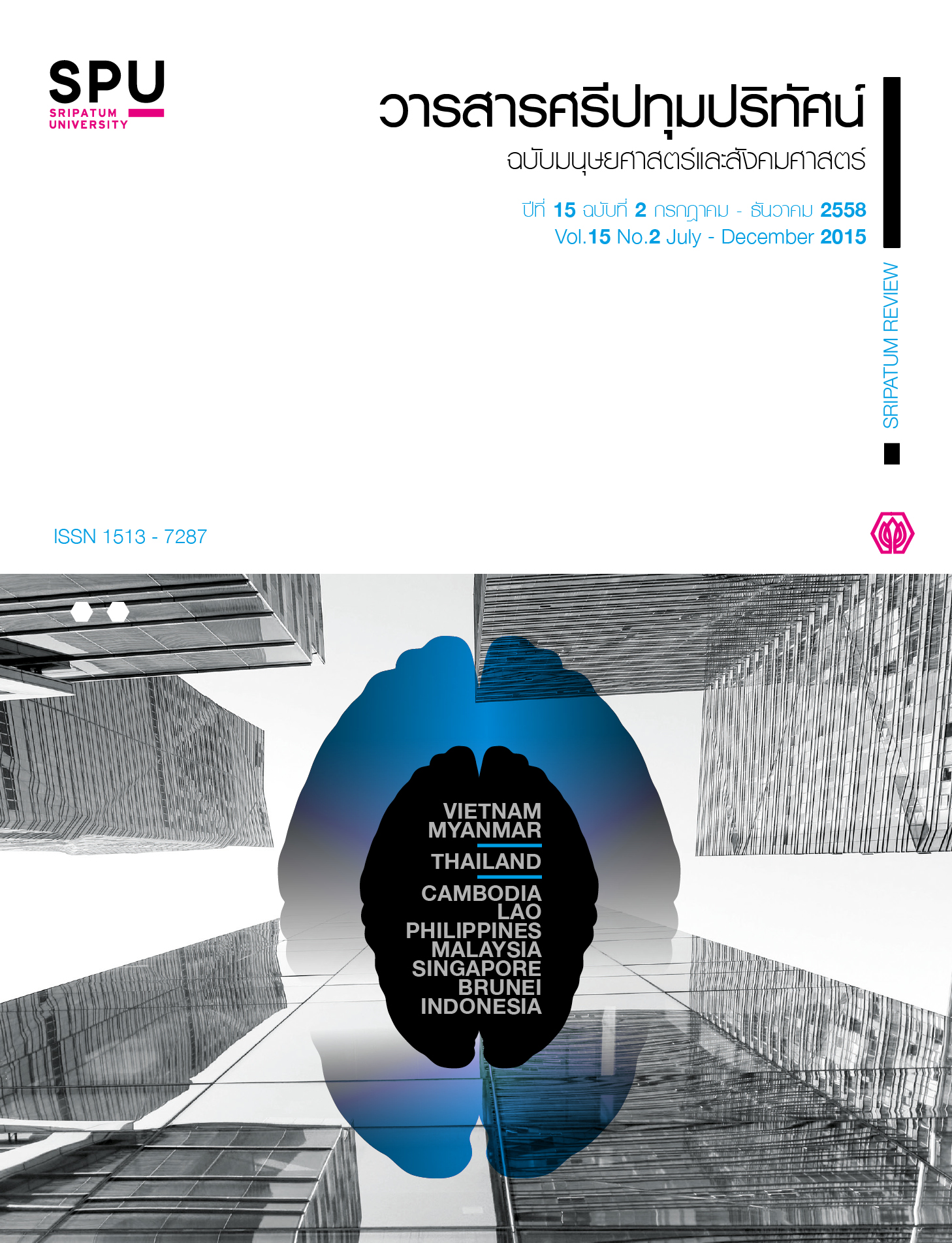A MODEL OF KNOWLEDGE ENHANCING OF THE YOUTHS IN SUKHOTHAI AND KAMPHAENG PHET PROVINCES BY MULTI-PARTY PARTICIPATION PROCESS TO PROMOTE WORLD HERITAGE TOURISM OF SUKHOTHAI HISTORICAL TOWN AND SURROUNDING TOWNS
Main Article Content
Abstract
New instructional innovations for learning management can play an important role in mobilizing the dynamics of tourism management. The purposes of this study were (1) to assess knowledge concerning tourism of Sukhothai historical town and surrounding towns of youths in Sukhothai and Kamphaeng Phet provinces; (2) to explore the needs for enhancement of tourism-oriented knowledge of the youths in Sukhothai and Kamphaeng Phet provinces in order to promote tourism of Sukhothai historical town and surrounding towns; and (3) to study a model of knowledge enhancement for youths in Sukhothai and Kamphaeng Phet provinces by multi-party participation process in order to promote tourism of Sukhothai historical town and surrounding towns. This study is a mixed-method research involving quantitative and qualitative research methodologies. Data were collected via the use of questionnaires, in-depth interviews, and focus group discussion. Research informants included 10 officials from work agencies dealing with world heritage tourism management, and 400 youths in district areas of Sukhothai old town, Si Satchanalai old town, and Kamphaeng Phet old town. Research findings showed that the majority (97.00 %) of youth informants had scores on tourism-oriented knowledge of 60 – 100 points. Their overall attitude toward tourism was at the agreeable level (mean = 4.02). They had the need for participating in knowledge enhancement activities at the moderate level (mean = 3.38). They expressed their needs for participating in knowledge enhancement activities in the topic of creating unity in the community in order to enhance cooperation for development of tourism. They would like to partake in tourism development activities presented to them via lectures concerning knowledge, concepts and experiences of the resource persons. The schools should be used as the training place. The number of trainees should not exceed 50 persons, and the training should take three days. The knowledge enhancement model should comprise three steps, namely, step 1: a survey of the need for enhancing tourism-oriented knowledge of the youths; step 2: the development of knowledge enhancement development process for youths; and step 3: the development of tourism knowledge enhancement activities on a continuing basis.
Article Details
1. กองบรรณาธิการสงวนสิทธิ์ในการพิจารณาและตัดสินการตีพิมพ์บทความในวารสาร
2. บทความทุกเรื่องจะได้รับการตรวจสอบทางวิชาการโดยผู้ทรงคุณวุฒิ แต่ข้อความและเนื้อหาในบทความที่ตีพิมพ์เป็นความรับผิดชอบของผู้เขียนแต่เพียงผู้เดียว มิใช่ความคิดเห็นและความรับผิดชอบของมหาวิทยาลัยศรีปทุม
3. การคัดลอกอ้างอิงต้องดำเนินการตามการปฏิบัติในหมู่นักวิชาการโดยทั่วไป และสอดคล้องกับกฎหมายที่เกี่ยวข้อง
References
กระทรวงศึกษาธิการ. 2548. มรดกโลกในมือเยาวชน. กรุงเทพฯ: คุรุสภาลาดพร้าว.
จำนงค์ อดิวัฒนสิทธิ์ และคณะ. 2547. สังคมวิทยา . พิมพ์ครั้งที่ 11 กรุงเทพฯ: มหาวิทยาลัยเกษตรศาสตร์.
ฐิติยา เนตรวงษ์. 2555. การสอนโดยวิธีการไปทัศนศึกษาที่ส่งผลต่อความตระหนักในวัฒนธรรมไทยและผลสัมฤทธิ์ทางการเรียนของนักศึกษาหลักสูตรเทคโนโลยีสารสนเทศ มหาวิทยาลัยราชภัฏสวนดุสิต .รายงานการวิจัยในชั้นเรียน.กรุงเทพฯ : มหาวิทยาลัยราชภัฏสวนดุสิต.
ดวงกมล ยุทธเสรี .17 สิงหาคม 2557.ผู้อำนวยการพิพิธภัณฑสถานแห่งชาติ รามคำแหง. สัมภาษณ์.
บัณฑิต ทองอร่าม .17 สิงหาคม 2557. หัวหน้าอุทยานประวัติศาสตร์ศรีสัชนาลัย. สัมภาษณ์.
เบ็ญจวรรณ บุญใจเพ็ชร. 2552. กฎหมายเพื่องานบริหารทรัพยากรบุคคล(ปรับปรุงใหม่). กรุงเทพฯ : เอช อาร์เซ็นเตอร์.
ประภา เพ็ญสุวรรณ. 2520. ทัศนคติ: การวัดการเปลี่ยนแปลงและพฤติกรรมอนามัย. พิมพ์ครั้งที่ 2. กรุงเทพมหานคร: พีระพัธนา.
พรชัย ศักดิ์ศิริโสภณ. 2555. “รูปแบบการมีส่วนร่วมของพหุภาคีในการจัดการงานประเพณีแห่ผ้าขึ้นธาตุ จังหวัดนครศรีธรรมราช”. วิทยานิพนธ์ปริญญาดุษฎีบัณฑิต สาขาวิชาการจัดการการท่องเที่ยวและการโรงแรม. บัณฑิตวิทยาลัยมหาวิทยาลัยมหาสารคาม.
“มรดกโลก”. พฤศจิกายน 2552.ผู้จัดการรายวัน:11
วรวิทย์ อวิรุทธ์วรกุล. 2544. ชุมชนเข้มแข็ง: รากฐานการพัฒนาประเทศที่ยั่งยืน.เศรษฐกิจและสังคม. วารสารเศรษฐกิจและสังคม: 18-26.
วิรัช วิรัชนิภาวรรณ . 2532 . การพัฒนาชุมชนประยุกต์. ภาควิชาสังคมศาสตร์ คณะมนุษยศาสตร์และสังคมศาสตร์มหาวิทยาลัยขอนแก่น . กรุงเทพฯ: โอ. เอส.พริ้นติ้ง เฮ้าส์.
วัลลภา เทพหัสดิน ณ อยุธยา. 2544. การพัฒนาการเรียนการสอนทางการอุดมศึกษา. กรุงเทพฯ:จุฬาลงกรณ์มหาวิทยาลัย.
สัมพันธ์ เตชะอธิก และคณะ. 2540. การพัฒนาความเข้มแข็งขององค์กรชาวบ้าน.กรุงเทพฯ: เจริญวิทย์การพิมพ์.
เอกวิทย์ ณ ถลาง, 2544. ภูมิปัญญาล้านนา : หนังสือชุดภูมิปัญญาชาวบ้านกับกระบวนการเรียนรู้และการปรับตัวของชาวบ้านไทย.กรุงเทพฯ: อมรินทร์.
อัศวิน แสงพิกุล. 2555. การวิเคราะห์งานวิจัยด้านการท่องเที่ยวและการโรงแรมในรอบทศวรรษ(2543 – 2553).รายงานการวิจัย.กรุงเทพฯ: มหาวิทยาลัยธุรกิจบัณฑิตย์.
Campoy Renee. 2005. Learning and Teaching Research-based Methods. Boston: Pearson Education.
Davis Louis E. 1977. Enhancing the Quality of Working Life : Developments in the United States. International Labour Review.
Krech D. Crutchfield, R.S.,Ballachey E.L.1962. Individual in Society. Tokyo: McGrae-Hill Kogakusha Ltd.
Mowen J. C. & Minor, M. 1998.Consumer Behavior. (5th ed.). New Jersey: Prentice-Hall.
Muller Helen J. 1994. Managing Diversity in Health Services Organizations. Hospital & Health Services Administration.
Oliva Peter F. 1992.Developing The Curriculum. 3rded. New York :HarperCollins Publishers.
Rokeach Milton. 1970. Beliefs, Attitudes and Values. San Francisco :Jossey Basso, Inc.
Rosenberg R.J. and Hovland,C.I. 1960. Attitude Organization and Change : And Analysis of Consistency Among Attitude Components. Wesport: Greenwood Press.
Taba Hilda. 1962.Curriculum Development : Theeory and Pratice. New Yord : Harcourt Brace &World.
Triandis H. C. 1971. Attitude and Change.New York: Wiley.


